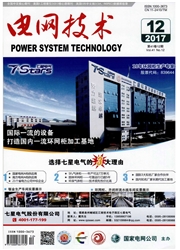

 中文摘要:
中文摘要:
针对城市园区微网中存在的"储-荷"互动特性,对可控空调负荷群进行集群需求响应控制,调节空调负荷曲线形成"虚拟储能"效应。提出基于连续状态变量约束的最优控制(continuous state constraints-based optimal control,CSCOC)模型,考虑"虚拟储能"和储能电池协同运行特性,构建了平抑微网联络线功率波动的策略。最优控制模型包括:1)描述"虚拟储能"系统物理机理的状态空间方程;2)构建了以功率为基础定义的"虚拟储能"虚拟荷电状态(virtual state of charge,VSOC),并给出"虚拟储能"系统、电池储能运行等式与不等式约束集;3)表示最优控制性能的目标函数。通过最优控制模型,实现微网联络线功率与设定目标参考值匹配。最后,通过算例进行灵敏度计算,分析了风电渗透率、电池容量等因素变化对最优控制算法的影响。结果表明,基于最优控制的"虚拟储能"和电池储能的优化协调,实现了精确追踪设定目标参考值的最优储能响应额度分配,能够保证电池储能荷电状态在合理范围之内,保证空调负荷运行的舒适性,维持用户进一步参与需求响应的积极性。
 英文摘要:
英文摘要:
Considering the interactive characteristics of "source-load" in city park microgrid, through centralized control of large scale air conditioners in microgrid, load curve can be adjusted to establish a "virtual storage" effect based on interactive features of "storage-load" in city park microgrid. Considering coordinated operation of "virtual storage" and storage battery, a strategy is built to suppress power fluctuation in tie-lines in microgrid based on continuous state constraint-based optimal control. There are three parts in optimal control model: 1) state space equation describing the system; 2) VSOC(virtual state of charge) based on power and equality/inequality constraints of "virtual storage" and storage battery; 3) objective function expressing optimal control performance. Using optimal control algorithm makes tie-line power of microgrid match reference value. At last, this paper discusses influence of renewable energy penetration and battery capacity on optimal control results with sensitivity analysis. Results show that optimal control of the battery and "virtual energy storage" solution can realize trace reference target accurately with optimal allocation of storage response amount, guarantee reasonable state of charge of battery,guarantee comfortability of air conditioner and maintain positivity of attending response of users.
 同期刊论文项目
同期刊论文项目
 同项目期刊论文
同项目期刊论文
 期刊信息
期刊信息
